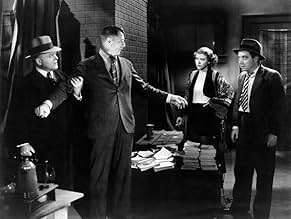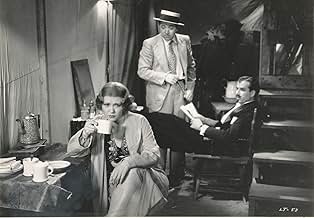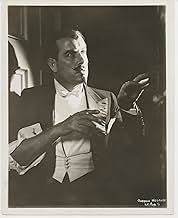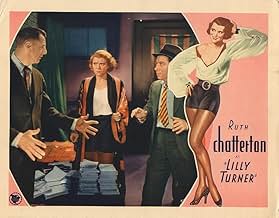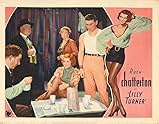Un mago de feria abandona a su esposa al enterarse de su embarazo. Ella se casa con el pregonero del carnaval, pero se siente atraída por un joven ingeniero.Un mago de feria abandona a su esposa al enterarse de su embarazo. Ella se casa con el pregonero del carnaval, pero se siente atraída por un joven ingeniero.Un mago de feria abandona a su esposa al enterarse de su embarazo. Ella se casa con el pregonero del carnaval, pero se siente atraída por un joven ingeniero.
- Dirección
- Guionistas
- Elenco
- Undetermined Secondary Role
- (escenas eliminadas)
- Earle
- (escenas eliminadas)
- Mrs. Flint
- (escenas eliminadas)
- Earle Yokum
- (sin créditos)
- Man in Carnival Audience
- (sin créditos)
- Man in Carnival Audience
- (sin créditos)
Opiniones destacadas
Poor Lilly, all I can say.
Ruth Chatterton was 40 passing as 22 when she starred in 1933's Lilly Turner. It's possible she met husband George Brent during the filming. The film also stars Frank McHugh. William Wellman directed.
This is precode. Lilly starts off married to an actor. Once on the train, he tells her vaudeville has no work for him. She winds up as his assistant for his magic tricks.
It's not much of a marriage. She finds friendship from a drunk on the circuit, Dave Dixon (McHugh). Her husband - who turns out to be a bigamist - disappears when Lilly becomes pregnant, so she marries Dixon, only to lose the baby.
She becomes the perfect female physical specimen for one of the acts; the male specimen Fritz (Robert Barrat) is in love with her. He turns out to be crazy and is institutionalized. His replacement is Bob Chandler (a mustacheless Brent), and he and Lilly fall in love.
I'm a fan of Chatterton's. I love the way she played these leading ladies past 40. She's wonderful as Lilly with all these men, including the carnival owner, crazy about her. She pulls it off. Wellman's direction is very good, with a few very noir scenes with crazy Fritz.
With the Great Depression in mind, Brent as an engineer who cannot find work is believable. More believable is attitude of the times, about responsibility. People's values were less self-centered. Just an opinion.
The first choice was bad as she was married, pregnant and abandoned by two timing rat Gordon Westcott. More of a rat than she thought as he was already married to Margaret Seddon. Seddon by the way has one great scene with Chatterton.
The baby was stillborn and Westcott had been a carnival magician. Carnival barker Frank McHugh with a real nasty thirst problem feels sorry for Chatterton and marries her. She loves him in her own way, but hates his drinking. She also attracts the the attention Guy KIbbee the owner of the show.
Which is a medicine show and the others work for him. Attractions that are come ons for his medicines. Kibbee starts taking a liking to Chatterton, but his Marjorie Gateson keeps him on a short leash. She's got a roving eye also however. Another strong performance in a small role.
Chatterton also has strong man Robert Barrat sniffing around. He's not got much upstairs, but he does have a temper. When he gets out of line he hires ambulance driver George Brent, clean cut All American kid who studied engineering in college, but in The Depression can't get a job in his field.
Chatterton and Brent were married at the time and a lot of his early roles come in her films. This was a play produced and written by George Abbott on Broadway that only ran 24 performances in 1932. Theater was a luxury that many did without a lot of material was bought by Hollywood on the cheap that turned into decent films.
Decent film this is and the ending isn't quite what might have been led to believe would happen. Good cast, good direction and too bad for George Abbott he didn't write this in better times.
Leo Forbstein's jolly score is cleverly based on the old tear-jerker 'Till We Meet Again' and 'Spin a Little Web of Dreams' from FASHIONS OF 1934. That's one example of how Warners blended strains of tragedy into an upbeat tone. Despite the unmitigated misery of the story, weirdly the mood of this is positive and optimistic - well, as optimistic a Depression audiences could hope for.
Poor Ruth Chatterton marries an abusive bigamist, gets pregnant, loses her job, loses her husband, loses her home, loses the baby and ends up in poverty working in a carnival side show run by a sexual predator with just one friend who's s hopeless alcoholic. All of that's just the first fifteen minutes! ... then it speeds up! It's astonishing how much story is squeezed into an hour whilst still fully developing the characters. One example of how Wellman condenses superfluous plot to allow him to focus on character is when McHugh helps out his friend Lilly. To save her from the stigma of becoming an unmarried mother he marries her but this whole story is handled in about ten seconds. McHugh says: 'I'll see you alright.' Then we simply see a marriage certificate.
In the best tradition of a Warner early thirties melodrama, just when you think things can't possibly get any worse for poor Lilly...it does. It's like every cliché, every story and plot twist from every pre-code movie ever have been squeezed into one wild and wacky hour. Any pre-code fan must see this - it's like all your Christmas presents rolled into one.
One reason for watching early thirties pictures is because they usually star a sexy young lady like Joan Blondell or Claudette Colbert and I must confess that foolishly I wasn't going to watch this simply because Ruth Chatterton isn't on 'my list.' My shallow stupidity almost made me miss this near classic. Ruth Chatterton is (as I've now learned usually is) fantastic in this. She's just so real. Her naturalness and ordinariness makes her so completely believable - which is a real feat considering the story.
One reason I decided to watch this is because it's directed by William Wellman. He's not someone you'd associate with melodramas, he didn't really enjoy having to do this but his genius turns this absurdly over-the-top story into a totally absorbing grown-up drama. He really captures the seedy, shabby and unstable world these poor victims of The Depression are forced to inhabit. He truly transports you body and soul back to 1933.
And another reason to watch this is because Frank McHugh and Guy Kibbee have both got proper parts. McHugh isn't just the five minute comedy relief drunk, Kibbee isn't befuddled old 'Pop'. No, they're both superb actors here portraying genuinely realistic and believable actual living people.
Can't believe I nearly didn't watch this - it's exactly the sort of movie a pre-code fan like me loves.
¿Sabías que…?
- TriviaWarner Brothers (which absorbed First National in November 1929) attempted to reissue Lilly Turner (1933), a pre-Code film, in 1936, but Joseph Breen denied them a Code certificate.
- ErroresWhen Lilly and Bob are in the truck, during the night at about 45 minutes into the film, David comes up from the bank and offers her a drink from his bottle. In one shot the label is facing her, in the next shot the label is facing away from her as Dave tried to hand her the bottle. When she drinks from the bottle, the label is facing away from her, but in the next shot as she finishes, the label is not visible. She goes to drink again and the label is visible once more.
- Citas
Doc Peter McGill: Folks, what is it that we all want? I ask you, what is it? Happiness! And you can't have happiness without health. And that's what I'm here to tell you about: health! And I can say without fear of contradiction, that if you follow the instructions in my little book closely, you'll never be sick again, as long as you live. Now, friends, before my assistants pass among you copies of this remarkable little book, I wish to introduce to you the most beautifully formed woman in all the world. Venus, herself, might envy her. A perfect specimen of womanhood! An amazing example of clean living and right thinking.
Lilly 'Queenie' Turner Dixon: Hello everybody. You may be surprised to hear that as a child I was deformed and practically a cripple. No one ever dreamed that one day I'd be well and strong. And I'm here to tell you that no woman should be discouraged with her figure, her face or her complexion. The truth is that thousands of tired, sick and overweight women have already proven that radiant health and a perfect figure can be acquired by following the instructions in Dr. McGill's Health book. I'm glad to have the opportunity to thanking Dr. McGill for my astounding good health. I thank you.
- Bandas sonorasI Love You Truly
(uncredited)
Written by Carrie Jacobs Bond (1906)
Played and sung at the wedding by unidentified performers
Selecciones populares
Detalles
- Tiempo de ejecución1 hora 5 minutos
- Color
- Mezcla de sonido
- Relación de aspecto
- 1.37 : 1
Contribuir a esta página



